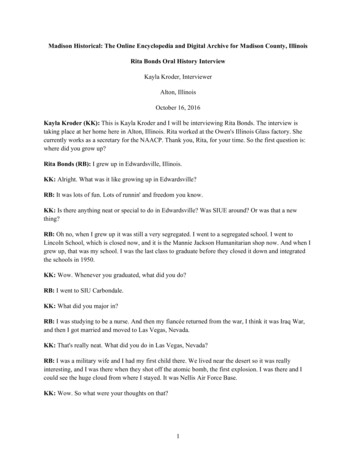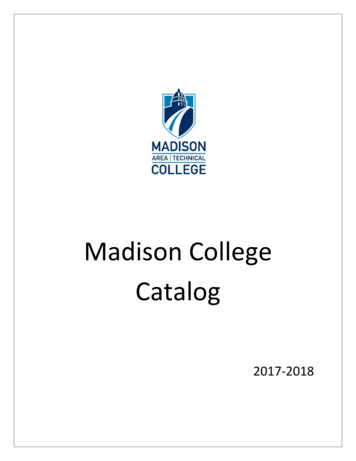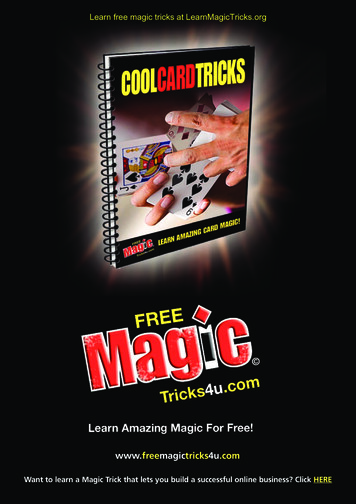
Transcription
Madison Historical: The Online Encyclopedia and Digital Archive for Madison County, IllinoisRita Bonds Oral History InterviewKayla Kroder, InterviewerAlton, IllinoisOctober 16, 2016Kayla Kroder (KK): This is Kayla Kroder and I will be interviewing Rita Bonds. The interview istaking place at her home here in Alton, Illinois. Rita worked at the Owen's Illinois Glass factory. Shecurrently works as a secretary for the NAACP. Thank you, Rita, for your time. So the first question is:where did you grow up?Rita Bonds (RB): I grew up in Edwardsville, Illinois.KK: Alright. What was it like growing up in Edwardsville?RB: It was lots of fun. Lots of runnin' and freedom you know.KK: Is there anything neat or special to do in Edwardsville? Was SIUE around? Or was that a newthing?RB: Oh no, when I grew up it was still a very segregated. I went to a segregated school. I went toLincoln School, which is closed now, and it is the Mannie Jackson Humanitarian shop now. And when Igrew up, that was my school. I was the last class to graduate before they closed it down and integratedthe schools in 1950.KK: Wow. Whenever you graduated, what did you do?RB: I went to SIU Carbondale.KK: What did you major in?RB: I was studying to be a nurse. And then my fiancée returned from the war, I think it was Iraq War,and then I got married and moved to Las Vegas, Nevada.KK: That's really neat. What did you do in Las Vegas, Nevada?RB: I was a military wife and I had my first child there. We lived near the desert so it was reallyinteresting, and I was there when they shot off the atomic bomb, the first explosion. I was there and Icould see the huge cloud from where I stayed. It was Nellis Air Force Base.KK: Wow. So what were your thoughts on that?1
RB: Yeah, "Wow." That was my thought. It is, I had read about it but, I was very young, I was like 20years old, and I just thought it was fascinating. That I could see the huge mushroom cloud- and it wasjust like a mushroom.KK: Where was this again?RB: Nellis Air Force Base, in Las Vegas Nevada. We stayed in a small town called Henderson. And,my husband drove back and forth to Nellis Air Force base.KK: When did you come back to Alton?RB: Oh let's see.When he got, he transferred from Nellis Air Force base to Whiteman Air Force basein Missouri. And we moved back here and I stayed on the air base with him. We stayed in town first, inSedalia Missouri. And then when we first moved back, he was going overseas, he went to a place calledThule. Thule Greenland, he there for about a year. And I stayed with my parents. And when he cameback went to Sedalia, Missouri. He was stationed at Whiteman Air Force base.KK: So whenever you guys left Whiteman, you came to Alton, then?RB: When he retired. No, first, we stayed at Whiteman Air Force Base, and I had a couple more kids.We went to Madrid, Spain for 3 years, nine months. And when we left Spain, we came back toWhiteman. And it was almost time for him to retire. So he put in for- We came up to Whiteman and westayed there and then the Vietnam War started. And he went to Vietnam and I moved back to Alton forthat year while he was in Vietnam. And then he went to South Dakota for one year after Vietnam, and heretired at Ellsworth in South Dakota. And then we moved back to Alton.KK: Okay. So at that time, you'd been maybe about 40 or 50 or so? [Yelling in background]RB: Football game.the question again?KK: Whenever you moved back to Alton, you were about 50?RB: Let me see, how old I was?KK: YeahRB: .oh wow.no I was.when he retired I was about 35.KK: Oh, that's wonderful. So the factory was still open then and it was.RB: Right. When he retired and we moved back here he was looking for work, and I was too. And I hada friend that worked there, in the office. I forget what his title was. But, he worked there and one day heasked, me, "How would you like to go to work at the glass factory?" I said, "Well gee, I don't know, I'venever worked at a factory before." And he said, "Well it's a glass factory where we make bottles and youwould examine the bottles and pack them." And I said, "Well okay, I'll give it a try." And it was on theday they landed on the moon, that was the day that I was supposed to go down there for an interview.That would be July the 20th, right? Yeah. And he called me and told me to come down for an interview.2
And I said, "Well I'm busy right now," because I was watching the TV, the landing on the moon. And soI didn't go for the interview. He called me the next day and said, "Why didn't you come for theinterview." I said, “What interview?” [laughs] he said, "My supervisor called employment office andcalled for you to come for an interview." I said, "Oh, I was watching the landing on the moon, I didn'tthink about going and looking for a job." So he said, "Well I ask and see if you can come." So, he madearrangements for me to come to another interview friend in high places. So, he made arrangements, andI went down and started work the next week in the glass factory. I had never worked in a factory, in factI had never worked outside the home before. Because I was a student, you know? And then I was a wife,mother, raising kids and so.I did volunteer work, but this was really something new for me.KK: How like, what was it like when you first went in the factory? Was it overwhelming?RB: Yeah. Very much so. But I was used to meeting strict people you know, because of travelling in theAir Force. And so, it was.I didn't know what to expect and we went to orientation you know and theytold us what to expect and they showed us the factory. I was really overwhelmed because I had neverbeen inside one. It was interesting, very interesting to see how the bottles were made. How they comeout on this roller and they're really hot. It was like 100 degrees near the layer, where the bottles comeout of the furnace room, and they mold and make the bottles. Then they come out under a long pad-like,bed-like roller. And they come out from under a curtain, and the workers stand there on either side of thelayer and as they bottles come out, they're all numbered in rows. And pick up certain bottles to see ifthey have any defects. You pick them up and you look at them, examine them, and if they have defectsyou throw 'em away. They have an inspector who looks at them first. And if one of the molds has adefect they call out back, to the people making the bottles, and they will take the mold off and fix thedefect, then replace the bottles. It was very interesting. They come out on like a big bed and they haverows and rows of bottles. I worked different companies, you know. Soda bottles.I didn't work on beerbottles at that time ,that was another area. But we worked on medicine bottles and soda bottles, and justbottles people use for different things. There was another layer there for medical bottles that they putblack plasma in.KK: I know what you’re talking aboutRB: There was only one girl that worked that layer because the bottles came out so slow. And she couldlook at them, examine them, and then pack them. And she didn't have anyone working with her. Andother layers usually had maybe 3 or 4 girls who pull the bottles off as they come through, and then theygo down the line and you have girls standing at a light, and as they come under the light you can see thedefects And they knock them down in a roller, and they roll them back to the back room, where theydump them, redo the glass, heat it again, and then redo the molds again. And then they come back outagain, and hopefully you know the don't have defects. And then we get down to the other end and thereare about 3 girls, and a light, and the inspector is there. And she will pull the defects out. She stands atthe layer and she will cut the bottles, and measure to see if they're the right weight and see if they're theright density and thickness. She'll cut them and measure them and if they were okay, they would sendthem on down the roller. And we would stand under the light and pick them up, look at them, roll themover, look at the bottom, and then pack them in boxes. And they go down, don’t stop, they keep going,and so you have to kind of work fast. Where I worked, there were like 3 girls standing there working,and as they would come under the light, if she missed one, because she couldn't see underneath the3
bottle, we would get the bottle, we'd turn it up, look at the top to see if there was a crack in the top. Welook, roll it in our hands to see if there's a crack on the side, flip it up, look under the bottom for cracks.And if they were okay, we'd put them in the box And as the box got full, like 24 bottles in a box, then itwould roll on down to the "End of the Layer," they called it. And there would be a young man there totake them off and then pack them on a crate you know. And roll it out to the warehouse.KK: WowRB: And you had to work fast. Because if you didn't pull them off, that round table where the bottleswent, it would fill up. And then they would start crashing and falling. And, it was really funny, the guysin the back room who made the bottles. If they heard all the bottles crashing, they knew they were losingmoney. So they want to know, "Why are you letting our bottles fall in the floor? Pack those bottles up!"You know? Yeah, it was really interesting. So you had to work fast. but you had to accurate also youdidn’t want to pack. And then we had an inspector, they would take the bottles to the warehouse andinspect them. And if they found too many defects they would send them back from the warehouse andthey wouldn't get shipped out to the customer. They'd go back to the warehouse and the girls who, it wassometimes a special group of girls that would go to the warehouse, and redo those bottles. And go overthem again, pull out that- they all had numbers on them, and they pull out certain numbers, and throwthose away. And repack the bottles to be shipped to the customer.KK: That seems like that would be actually pretty tough to do.RB: No, it wasn’t tough. It was interesting. Well, I thought it was interesting. Cuz I had neverexperienced working before, so to me, it was really fascinating. To see, to see it work. And there wasone, where you made baby food. And they were really strict on packing baby food bottles. Because thatwas, you know, you don't want to send broken bottles. because as they leave there, they'd go to thecompany and they would pack baby food in them. And you didn't want them to pack, pour applesauce orgreen beans into a bottle, and it would break? Well That would stop their production, and mess up thewhole thing. They'd have to stop production, clean up the broken bottles of baby food, and then startover. So we had to really be careful. But that's on all of them though, be really careful you know aboutsending out defective bottles. Because it would go to the manufacturer and if you broke up too manybottles they would lose that contract, you know? You see what I mean? So we had to really be carefulabout sending out defective bottles. They call it "Ware" W-A-R-E. They called it WARe, youknow,That was the term for the bottles we did.KK: WOW, That's really neat. So, where there any benefits to working for the factory?RB: Yeah there was a union. We had a union there. They paid good money. Well, I thought it was goodat the time. Cuz I had never worked before. They had a union and they had hospitalization if anyone gothurt, you went to the doctor there at the factory there. And if you were sick enough you could go home.You had breaks. You worked so many hours and then you got a break, and then you got a lunch break.There was young lady in charge of the shift, there were three shifts. I worked B. there was A, B, C, andD. And I worked B shift. And if you worked on line you didn't go home until someone came to relieveyou. A group had to come and relieve you. You couldn't just walk off, and cuz the bottles kept going. Soyou had to wait for the shifts. They shifts were like 7 in the morning till 3 in the afternoon, and then 3 to4
11. There was another shift from 11 to 6 in the morning. Well 7. And you had a break, and you had alunch room where you go. Not a lunchroom, but a room where you go to eat your lunch. They didn'thave a cafeteria. You brought your lunch from home.KK: Were you able to get any free bottles or anything like that, or?RB: Free bottles?KK: Yeah, you know from working out there. Like sometimes Subway does, you get a free sandwichwhen you work on a shift? No?RB: No. We didn't have free bottles. We had a little club. We had a little club where we played softball,among ourselves. There was a bowling team. And golf league. Yeah. They had recreation things. Theyhad a beautiful park that was out in Godfrey. Beautiful acres of park. It had a pavilion, area for playingsoftball, a little lake to fish. And things for kids to play on. And they had an annual picnic every year. Sothere's a lot of benefits there you know. For socializing. Then they had a club-room across the streetfrom the glass-works. They would meet there for different club organizations and union meetings andthings like that. Yeah. It was fun. The groups, the groups too. The interactive club, with just the peopleon that shift. But then when we had a big picnic it would be different ones from different shifts wouldcome to the party you know. So it was nice. We had Christmas parties and yeah, they had things forfamilies too.KK: That's really nice. Did you face any challenges while working there, at all?RB: Facing what?KK: Difficulties with the factory, co-workers, management?RB: No, no I didn't. I got along well with the girls I worked with. And management, they didn't harassyou or anything or make you work in an unsafe environment. It was always really, in fact sometimes, wewould be working and one of the supervisors would be down, walking around, you know, and if hewould stop to pick up a box.I’ll never forget this, there was a union rep standing on the walkway, thecatwalk, they called it, and company man would stop to pick up a box or something, and the union man[slapping sound]. The company could not interfere with our work, with what we're doing. It was a unionrepresentative walking around. he was a worker, but he was observing, too. to see if anyone from thecompany interfered or mistreated the workers. So, I didn't ever see any interference or, you know, thingsfrom the union. And I would go to union meetings. You had to pay dues to be in the union. Thecompany, I thought, they were pretty good to the workers. It was a safe environment, because if you gothurt you immediately would go to the medical office there. And if you felt ill you'd upstairs to the ladyin charge of the hour that we worked. She was our supervisor call her. And you'd go up there if you hada phone call to call home, she would contact your family. If someone at home called you, say a memberat home was sick, they'd get in touch with you. And they'd bring you up, they get someone to replaceyou on your job, and they bring you upstairs to talk on the phone. Because I had a son who had asthma,and, I got called several times and I had to leave work and take him to the hospital, because he washaving an asthma attack. And there was never any problem about me leaving work, you know, to seeabout him. So, all in all, I thought it was a very good environment to work. I don't have nothing to5
compare it to because I had never worked before. But after I had worked there for a couple of years andI realized, this isn't the place I'm want to spend 30 years, because I was talking with the different girlsthere who worked there. And most of them had worked there since they were 17, 16, out of high school.And some of them didn't finish high school. And I said, we weren't supposed to talk about how muchmoney you made, you know, but you did. You found out you know without asking, really. it came upafter I had been there several years, talking with an older woman about working there. And she had beenthere a long time and, I don't know how the money part came in, but I found out she was only makingfifty cents an hour more than me. And I had only been there like 3 years. And I said, "You've been herehow long?" "Twenty-five years." And she was glad to have the job. You know? I said, "Oh." I was justtalking with her, and I talked with several other people, and so when the young girls would come andwork in the summer, you know. When school was out, they'd come and get a job in the summer, andthey'd go back to school. I would tell them, "You don't want to stay here for no twenty-five or thirtyyears." I said, "This is okay for the summer, but you go back to school and get an education. Becauseyou don't want to spend." They were really nice ladies but I could not imagine myself staying there thatlong and still making just fifty-cents more than what the girls who just walked in the door were making.Because, by then, they were renegotiating, and wages were getting better, and the union wasn't workingto improve the working environment. So I encouraged the young girls who came to work in the summerto go back to school. You don't want to stay here. She was a nice lady, but she was old and thin, andreachin' up and pullin' these boxes down. She didn’t' really have to do that.if the boxes got jammed upshe would lift them off and sit them on the floor, and they'd pick 'em up. And she was an older woman.And I said, "No. You don't want to do this when you get that old." So I encouraged the younger girls,you know, work for a little while, but then go back to school. This is not what you want to do for thenext thirty, forty years. But, the ladies I had talked to, they had worked there since they were 17. Andbought a home and raised their family, but things were not as high then. The economy was gettinghigher, things were changing. We'd been through another war. And things were just different. And Icould see that. And the younger girls, they thought it was fun. They enjoyed it because they liked thatpaycheck and liked the hours and the shift, and it was a lot of fun. but then they would work a couple ofsummers and I never saw them back again. They went and got another job, probably, and graduated, andmoved on. Very few stayed after I left. I stayed there, some of them stayed because they had familiesand had started buying a home. So they needed that paycheck if their husband's check didn't covereverything you know. Some of them stayed until they closed the factory down. Some of the youngerones left and went back to school.KK: When you were talking about the economy was changing, during the wars. Would you liked toexplain that a bit more?RB: Well, I would say as the prices got up higher, the price of food and housing and everything startedchanging like that, and the money didn't go as far as it did when I first started out. Everything washigher by then. So the check that you made just didn't go as far. It's just like it is now, your paycheckdoesn't stretch as far this year as it did last year. Because the groceries are going up higher, every timeyou go to the grocery store, the prices are up again. That's the way it was, even then. I noticed it. I don'tknow, I imagine those other ladies did. One lady, she'd been there.she was like fifty-five years old, andshe'd been there twenty, twenty, thirty years. but she's only fifty-five. So she couldn't retire and getsocial security or anything. And then when they started closing down, offering you to retire, a lot ofthem had the time, but weren't old enough. You see what I mean? And they wouldn't get the full6
benefits, because of the difference. And this lady, she'd been there all that time, but she wasn't oldenough to get full retirement. So they lost part of their retirement money. I don't know.itwas.interesting when you look at it like that. But when I first went there it was just fun for me. Becausemy husband was still alive and
Madison Historical: The Online Encyclopedia and Digital Archive for Madison County, Illinois Rita Bonds Oral History Interview Kayla Kroder, Interviewer Alton, Illinois October 16, 2016 Kayla Kroder (KK): This is Kayla Kroder and I will be interviewing Rita B











